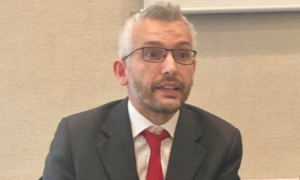Intl law in the face of genocide: Seven takeaways from interview with Triestino Mariniello

Triestino Mariniello
Romana Rubeo reports in The Palestine Chronicle on 7 May 2025 on her interview in a recent FloodGate podcast with Professor Triestino Mariniello [Professor of Law at Liverpool John Moores University] who dissected the role of international law in the face of the Gaza genocide, raising critical questions about accountability and justice for Palestine.
**** ****
Here are the seven takeaways from the interview:
ICC & ICJ
The discussion delved into the intricate role of international law and its institutions in addressing the case of Palestine. Marinello elucidated the distinct functions of the ICJ, which handles disputes between states, and the ICC, which prosecutes individuals for serious crimes. The conversation underscored the challenges inherent in applying and enforcing international law, particularly in politically charged situations where state cooperation is crucial yet often fraught.
“The International Court of Justice is the highest judicial body of the United Nations. It has competence in relation to the state’s responsibility. So in contrast to the International Criminal Court, the International Court of Justice does not deal with individual criminal responsibility, but in other words, it deals with potential violations of international law by states,” Mariniello explained.
“On the other side, we have the International Criminal Court, which is not a UN body. It’s an independent body created by states in 1998 in Rome, and (…) it deals with individual criminal responsibility. In other words, it has competence over individuals allegedly responsible for war crimes, genocide, crimes against humanity, and potentially the crime of aggression.”
Israeli Violations
A significant portion of the discussion addresses the grave accusations leveled against Israel concerning its violations of international law. Marinello highlighted the ICJ’s findings indicating the plausibility of Israel committing genocide in the Gaza Strip and the ICC’s issuance of arrest warrants targeting Israeli leaders.
“With regards to the International Court of Justice, first of all, South Africa has brought a case against Israel for the violation of the genocide convention uh in 2024,” he said. “So on three different occasions, the International Court of Justice has found that it’s plausible that Israel is committing genocide in the Gaza Strip. In other words, it’s violating the genocide convention of 1948 and has imposed provisional measures on the Israeli authorities.” “So far, Israel has not complied with any of the provisional measures uh imposed by the International Court of Justice,” Mariniello added.
Double Standards
Rubeo and Marinello explored the persistent concerns about double standards and political influence within international legal frameworks.
The conversation questioned the perceived neutrality of these institutions, raising the issue of selective enforcement and the potential for political bias to undermine their legitimacy. “It’s not clear why Netanyahu would have immunity for this state but not Putin, who is still the president of another state,” Maniello said. “It’s again the usual double standards policy, which so far, in my personal views, has been one of the main causes behind the commission of the most serious violation of international law by the Israeli authority in Gaza, but overall in the entire Palestinian occupied territory.”
